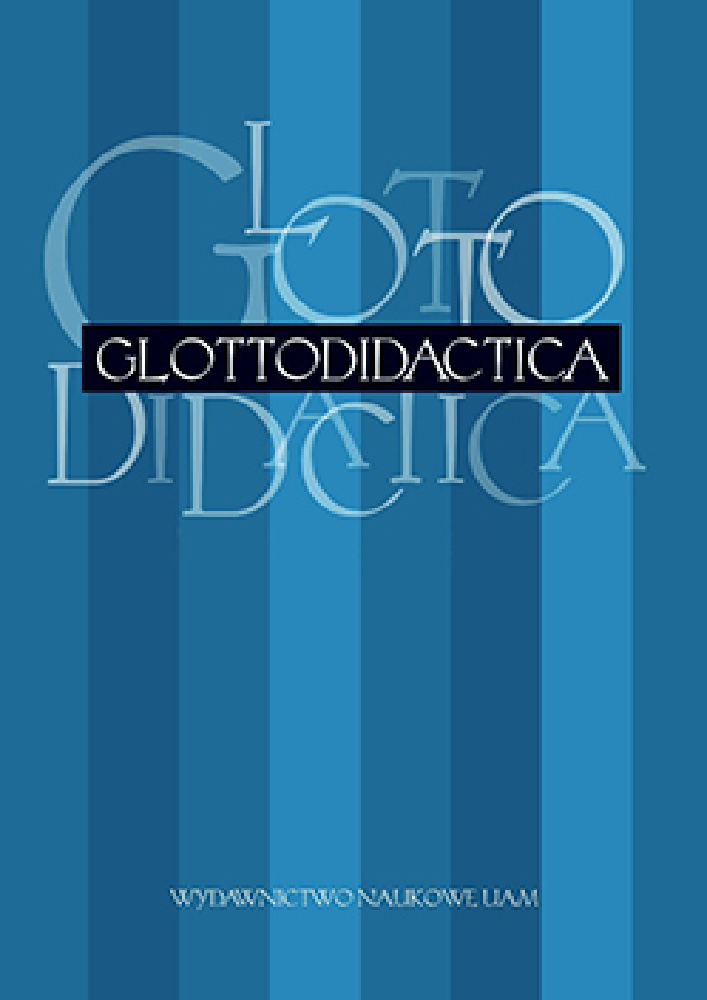Abstract
In this paper, the authors present an analysis of students’ narratives on their way to becoming competent English as a foreign language (EFL) users. Before presenting our study we refer to the ecological perspective on language learning/teaching, which may show the important impact of the learners’ environment for EFL development. We refer to studies which point to the importance of the environment for language learning and which used various methods of research. In our study, we apply a narrative approach. The collected corpus of narratives is analysed following the grounded theory within the psychological model of wellbeing, i.e. the PERMA model. Eventually, we decided to concentrate on the impact teachers have on learners’ emotions, engagement, meaning, relationships and accomplishment.
References
Ary, D. / Jacobs, L. C. / Sorensen, C. K. / Walker, D. (2014). Introduction to research in education (9th edition). London: Wadsworth.
Benson, P. / Nunan, D. (eds.) (2004). Learner stories: Difference and diversity in language learning. Cambridge: Cambridge University Press.
Bielak, M. I. (2016). English language teaching and learning in the Polish high school classroom: Towards the elementary space of home. In: M. Krawiec (ed.), New insights into language teaching and learning practices (pp. 3–19). Regensburg: Sprachlit.
Bronfenbrenner, U. (1979). The ecology of human development. Cambridge, Mass.: Harward University Press. DOI: https://doi.org/10.4159/9780674028845
Common European framework of reference for languages: Learning, teaching, assessment (2001). Strasbourg: Council of Europe – Cambridge University Press.
Corbin, J. / Strauss, A. (2007). Basics of qualitative research (3rd edition). Thousand Oaks, CA: Sage.
De Wilde, V. / Eyckmans, J. (2017). Game on! Young learners’ incidental language learning of English prior to instruction. Studies in Second Language Learning and Teaching, 7 (4), 673–688. DOI: https://doi.org/10.14746/ssllt.2017.7.4.6
Francuz, G. (1999). O nową integrację wychowania. Ekologicznie zorientowana antropologia filozoficzna a wychowanie. Kraków: Oficyna Wydawnicza „Impuls”.
Fromm, E. (1956). The art of loving. New York: Harper & Row.
Ishihara, N. (2012). Critical narratives for teaching pragmatics: Application to teacher education. The European Journal of Applied Linguistics and TEFL, 2, 5–16.
Johnson, K. / Golombek, E. (2002). Teacher’s narrative inquiry as professional development. Cambridge: Cambridge University Press.
Kramsch, C. / Steffensen, S. V. (2008). Ecological perspective on second language acquisition and socialization. In: P. A. Duff / N. H. Hornberger (eds.), Encyclopedia of language and education. 2nd edition. Vol. 8: Language socialization (pp. 17–28). Springer Science + Business Media LLC.
Larsen-Freeman, D. (2015). Foreword. In: J. King (ed.), The dynamic interplay between context and the language learner (pp. xi-xiii). New York: Palgrave Macmillan.
Lemke, J. L. (2002). Language development and identity: Multiple timescales in the social ecology of learning. In: C. Kramsch (ed.), Language acquisition and language socialization. Ecological perspectives (pp. 68–87). London: Continum.
McCallum, F. / Price, D. (2016). Wellbeing for all. In: F. McCallum / D. Price, D. (eds.), Nurturing wellbeing development in education. From little things, big things grow (pp. 22–39). London, New York: Routledge. DOI: https://doi.org/10.4324/9781315760834
Oxford, R. (2015). What we can learn about strategies, language learning, and life from two extreme cases: The role of well-being theory. Studies in Second Language Learning and Teaching, 4 (4), 593–615. DOI: https://doi.org/10.14746/ssllt.2014.4.4.2
Oxford, R. / Cuéllar, L. (2014). Positive psychology in cross-cultural narratives: Mexican students discover themselves while learning Chinese. Studies in Second Language Learning and Teaching, 4 (2), 173–203. DOI: https://doi.org/10.14746/ssllt.2014.4.2.3
Pfeiffer, W. (2010). Esej o przywracaniu równowagi w glottodydaktyce polskiej. In: Z. Wąsik / A. Wach (eds.), Heteronomie glottodydaktyki. Księga jubileuszowa z okazji sześćdziesięciolecia urodzin prof. dr hab. Teresy Siek-Piskozub (pp. 75–85). Poznań: Instytut Filologii Angielskiej UAM.
Seligman, M. (2011). Flourish: A visionary new understanding of happiness and well-being. New York: Simon & Schuster.
Siek-Piskozub, T. (2016). The compatibility of positive psychology and the ludic strategy in the foreign language education. Glottodidactica, 43 (1), 97–106. DOI: https://doi.org/10.14746/gl.2016.43.1.7
Van Lier, L. (2010). The ecology of language learning: Practice to theory, theory to practice. Procedia Social and Behavioral Sciences, 3, 2–6. DOI: https://doi.org/10.1016/j.sbspro.2010.07.005
Williams, M. / Burden, R. L. (1997). Psychology for language teachers. A social constructivist approach. Cambridge: Cambridge University Press.
License
Copyright (c) 2018 Teresa Siek-Piskozub, Aleksandra Jankowska

This work is licensed under a Creative Commons Attribution-NoDerivatives 4.0 International License.
Authors
Authors of texts accepted for publication in Glottodidactica are required to complete, sign and return to the Editorial team’s office the Agreement for granting a royalty-free license to works with a commitment to grant a CC sub-license.
Under the agreement, the authors of the texts published in Glottodidactica grant Adam Mickiewicz University in Poznań a non-exclusive, royalty-free license and authorize the use of Attribution-NoDerivatives 4.0 International (CC BY-ND 4.0) Creative Commons sub-license.
The authors retain the right to the free disposal of the work.
Users
Interested Internet users are entitled to use works that have been published in Glottodidactica since 2016, under the following conditions:
▪ attribution – obligation to provide, together with the distributed work, information about the authorship, title, source (link to the original work, DOI) and the license itself.
▪ no derivatives – the work must be preserved in its original form. Without the author's consent, it is not possible to distribute the modified work in the form of translations, publications, etc.
Copyrights are reserved for all texts published before 2016.
Miscellaneous
Adam Mickiewicz University in Poznań retains the property right as a whole (layout, graphic form, title, cover design, logo etc.).
Privacy statement
The names and email addresses published on this journal site will be used exclusively for the purposes declared by this journal and cannot be used for any other purpose or by any other party.





